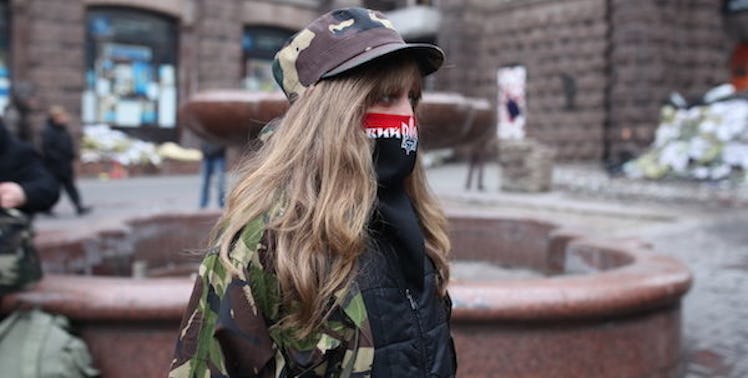
Iron Curtain: Is The US Using Ukraine As A Pawn For A Second Cold War?
The great Winston Churchill popularized the term "Iron Curtain," complaining that Russian dominance in Eastern Europe would bring down an Iron Curtain on intelligence.
The British writer George Orwell added "Cold War" to the mix, stating the world was being dragged into a nuclear stare-down between East and West, between American and Russian.
It's been two generations since Americans have had to live under the threat of nuclear annihilation. But in mid-April, "Russia Today" televised the US was reopening a nuclear bunker.
So, what's going on? Reports from the Ukraine's second largest city, Kharkiv, include a series of bombings in the last few months. Citizens of Kharkiv have also reported a worry of civil war since the 2014 Ukrainian Maidan coup (perhaps because of its proximity to Russia).
News agency Reuters warns of an all-out war around Kharkiv as French tanks pivot to Poland, and Baltic countries bomb their waters in search of Russian subs.
Arson has been reported in the Ukrainian forests of Chernobyl, releasing untold amounts of radiation into the swirling winds of Northern Ukraine and out across Eastern Europe.
So, is the Ukraine making good on promises to bomb Russia out of existence with a dirty bomb, or is this all just an honest mistake?
While "Russia Today" documented Ukrainian firefighters risking their health to stop the blaze, the West has been eerily silent.
From the moment anti-Russian protests in winter 2013 turned violent in the Ukraine, there have been two stories of events on the Black Sea: Western and Eastern.
Western mass media irresponsibly attacked the legitimacy of referendums in Eastern Ukraine.
It has spread the idea that, somehow, the Russian Federation annexed Crimea, emboldening Ukrainian troops to throw down their arms and attempt to overrun their enemy with non-violent marches.
The Eastern version is that internationally-coordinated troop movements observing pacts between Russia and the Ukraine over Crimea allowed for an increase in Russian soldiers, and, overall, everyone completed complicated redistributions with expediency and professionalism.
Since then, the Western media has been unrelenting in its contention that pro-Russian separatists are tearing apart the peace of the Ukraine.
Russian dissidents have ridiculed an absurd lack of actual evidence, supporting the right of Easterners to distance themselves from Western coups.
Still, former Secretary of State Hillary Clinton compared Russian president Vladimir Putin to Adolf Hitler in March, drawing parallels between the president's protection of nationals abroad to Hitler's "protection of ethnic Germans outside Germany."
Putin called Clinton inelegant on French television, depicting her in a very sexist manner. He also explained he and Clinton could, however, "reach an agreement."
In a response to Russia's guarantee of $15 billion in loans along with a discount on natural gas prices, pro-European Maidan protestors violently rejected Soviet symbology, toppled statues and entrenched against police by provoking beatings and subsequent media condemnation.
International talks to investigate the gangs suspected responsible for fomenting civil war between the East and the West crumbled as the Ukrainian President Viktor Yanukovych fled the capital after mysterious snipers shot and killed some 90 people, both police and protesters.
Just a week beforehand, Assistant Secretary of State for European and Eurasian Affairs, Victoria Nuland, was caught cursing the EU and conferring on the future management of Ukraine with US Ambassador to Ukraine, Geoffrey Pyatt.
The East accused the US of warmongering, and the West used the overt aggression of a corrupt Ukrainian narrative to promote increased Western involvement in a country with a rickety past and a hope for the future.
In May 2014, in Odessa, buildings burned and dozens of people were massacred for their pro-Russian sentiments.
The second official language, Russian, had been banned. Nuclear annihilation of the enemy was promised, and the Western media paid no attention to the neo-Nazi elements.
Regions in Eastern Ukraine seceded democratically later that May, as the US and NATO countries continued to disregard democracy and sanctioned Russian economics for daring to recognize rebels of a coup.
A Ukrainian force laid siege to Eastern cities, shelling and starving millions with alleged white-phosphorus.
As US President, Barack Obama, spoke on Russian aggression, he was bolstered by the pro-Russian separatist moniker spread by the media to be used for Eastern-Ukrainians.
President Obama seemed glad to broaden the scope of the American military, substituting Russian backing of Ukrainian gas companies with vice presidential nepotism.
Magazines like The Economist backed off from criticizing President Obama for mismanaging a decade of fracking and joined the army of journalists attacking Russian President Vladimir Putin as evil.
It took five months for US Congress to approve $350 million in lethal aid to Ukraine.
Global oil prices tanked, and the Russian ruble fell as two and half billion people representing Russia-supporting BRICS nations continued to separate from the warring US dollar.
Two months later, Western European powers brokered a cease-fire in Minsk. Since then, Ukrainians have made their people conform to the Western stylizing of World War II history, as Poland clamors for weapons, disallows a Russian biker parade to Berlin, bars Russians from restaurants and admits a covert role in the Maidan sniper killings.
As Easterners level charges of propaganda against the Ukraine and the West over the radioactive potential of the fires of Chernobyl, the calculus of war and sanctions are shifting with the ascendant Chinese banking union and a growing distaste for the petrodollar.
On English-language Russian television, Iranian leadership points to nuclear weaponry as a deterrent against invasion.
But with the US's assault on Russia from Romania, Lithuania, Finland and especially through the Ukraine, this is no longer true.
A Federalist agenda to control information and export war does not make us safe.